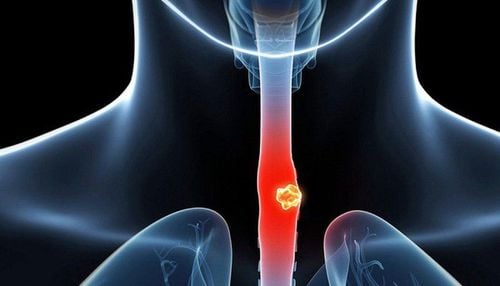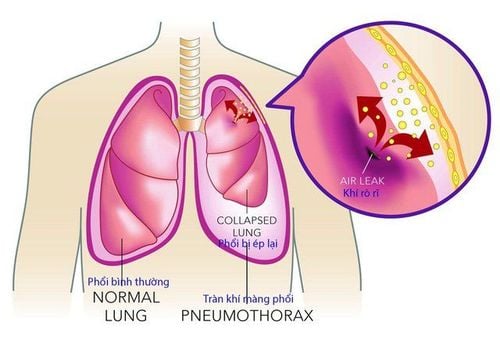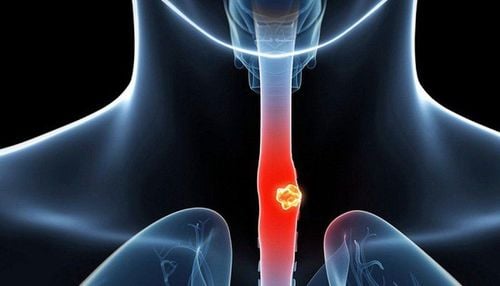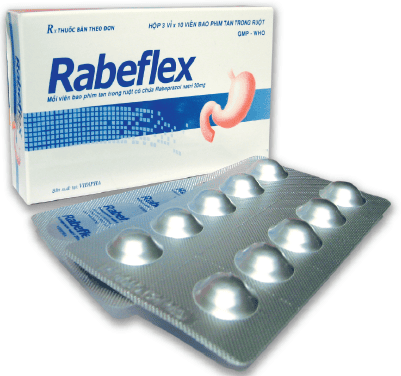This is an automatically translated article.
Esophageal cancer is one of the most common cancers in the gastrointestinal tract. For different disease manifestations in each stage, esophageal cancer is often difficult to detect in the early stages. So how to know if the symptoms of esophageal cancer are easy to recognize? Read more articles below to know the symptoms of esophageal cancer.1. What is esophageal cancer?
More than 7 in 100,000 people are diagnosed with esophageal cancer each year, while 3 out of every 100,000 people die from the disease. About 0.8% of all men and women will be diagnosed with esophageal cancer at some point in their lives. As of 2017, 116,525 people in the United States are living with esophageal cancer.
In 2020, the National Cancer Institute estimates there will be 27,600 new cases of esophageal cancer diagnosed, representing about 1.5% of all new cancer cases. The NCI also predicts 11,010 deaths from esophageal cancer in 2020, accounting for 1.8% of all cancer deaths.
Because esophageal cancer affects men and women differently and can be difficult to diagnose, it is important to understand its unique features and the diseases it can mimic.
Esophageal cancer occurs when normal healthy cells are replaced by cancerous cells growing in the lining of the esophagus. The esophagus is located just below the esophagus, the tube that carries food through to the intestines after swallowing. The esophagus is the part of the digestive tract that digests food and moves nutrients through the intestines to the small intestine.
Because this type of cancer is usually slow growing, it can take years to develop. Esophageal cancer usually begins when previously healthy cells begin to grow out of control in the lining of the esophagus. This collection of cancer cells is called a tumor, and over time these cells will spread to other layers of the esophagus.
Esophageal cancer in the upper third is usually squamous cell cancer and adenocarcinoma is common in the lower third. Symptoms of esophageal cancer are progressive dysphagia and weight loss, and staging is based on endoscopy, chest CT and endoscopic ultrasonography. Treatment depends on the stage and usually includes surgery with or without chemotherapy and radiation. Survival will usually be short unless the disease is localized.
There are different types of esophageal cancer:
Adenocarcinoma: Adenocarcinoma is the most common type of esophageal cancer, accounting for more than 90% of esophageal cancers. Carcinoma occurs in the innermost lining of the esophagus. Lymphoma: Cancer of the immune system accounts for 4% of all cancers of the esophagus, which are not from the lining of the lining of the esophagus. It is divided into primary and secondary lymphoma of the esophagus. Primary lymphoma involves the esophagus and can eventually affect the lymph nodes, bone marrow, and other parts of the body. Secondary lymphoma initially involves other parts of the body, such as the circulation, lymph nodes, bone marrow, and other organs. Second, the cancer has spread to the esophagus. Gastrointestinal stromal tumor: A type of soft tissue sarcoma that can develop in the connective tissue of the esophagus. Neuroendocrine cancers: Also known as carcinoid tumors, neuroendocrine cancers originate in cells in the nervous and endocrine systems of the intestines.

Dấu hiệu của bệnh ung thư thực quản cần được phát hiện sớm
2. Are the symptoms of esophageal cancer easy to recognize?
In the early stages, esophageal cancer has no symptoms. However, as the tumor grows, symptoms may also appear: painful swallowing, difficulty swallowing; thin and lose a lot of weight; sore throat or back, behind the breastbone or shoulder blades; sore throat or persistent cough; vomiting and coughing up blood. These symptoms may be caused by esophageal cancer or by another disease, so with these symptoms, in addition to clinical examination, it is necessary to perform some tests: esophagogram with oral contrast; esophagoscopy; computed tomography (CT Scanner; bone scan) and PET/CT scan to see the extent of the cancer.
4 stages of esophageal cancer will include:
Stage 1: The cancer is in the top layer of the wall of the esophagus. Stage 2: Cancer has spread to deeper layers of the esophageal wall or has invaded nearby lymphatic tissue. Cancer has not spread to other parts of the body. Stage 3: Cancer has invaded deeper layers of the esophageal wall or has invaded tissues or lymph nodes in the paraesophageal region. Stage 4: Cancer invades other parts of your body. Cancer can spread to any location including the liver, lungs, brain, and bones. The most obvious sign of esophageal cancer is that at first the patient has difficulty swallowing only solid foods, later on, it is difficult to swallow both liquid foods and even swallowing saliva is painful and difficult to do. Patients often have salivation accompanied by bad breath, belching, choking when eating and drinking, and a lot of weight loss. In addition, the patient may also have pain in the throat or back and behind the breastbone or shoulder blades. Sore throat or persistent cough, vomiting or coughing up blood. These symptoms may be caused by esophageal cancer or by another disease.
For these symptoms, you need to see a doctor for examination and advice. Because in fact, just relying on the symptoms of the disease (typically choking, difficulty swallowing) is not enough to conclude that you have this disease. The diagnosis of esophageal cancer must also be based on imaging tests and other laboratory tests. For an accurate diagnosis of esophageal cancer, patients need to have endoscopy combined with ultrasound and biopsy to see abnormal images of the shape of the esophagus as well as cancerous organizations or other abnormalities. organization often leads to cancer or other damage. Cancer screening is the most important factor to help prevent and detect this disease early, especially for patients with a history of prolonged esophagitis, neck cancer, etc., need to see a doctor. regularly for timely disease detection and effective treatment.

Khó nuốt là một trong các dấu hiệu của bệnh ung thư thực quản
3. How can you detect esophageal cancer early?
Be sure to contact your health professionals if you feel something is wrong with your stomach or esophagus. There are screening tests for esophageal cancer when people are at risk or are showing signs and symptoms.
Diagnostic evaluations for esophageal cancer include:
Perform regular physical exams. Upper gastrointestinal endoscopy to view the esophagus, esophagus, and small intestine after sedation. A small, flexible tube is inserted into your mouth with a small camera at the end that allows your doctor to see inside your esophagus. Esophageal tissue biopsy for microscopic evaluation CT scan to visualize organs during X-ray Endoscopic ultrasound to diagnose and treat esophageal cancer simultaneously by visualizing organs and nearby blood vessels Positron emission tomography (PET) to illuminate cancer cells. Radioactive sugar markers are used because cancer cells use more sugar than healthy cells, and the tracer lights up cancer cells. You can treat stomach cancer by changing your diet
Using a healthy diet to treat stomach cancer is not enough to cure cancer, but you can talk Talk to your doctor about using it as part of a medical plan to improve your overall health. People who eat a diet rich in foods like fresh fruits and vegetables and whole grains have a reduced risk of stomach cancer. However, some research suggests that fortifying plant-based foods reduces the risk of fatal stomach cancer in men, but not in women. Talk to your healthcare provider about your dietary options.
Which doctor treats which stomach cancer?
There is a team of specialists who care for people with stomach cancer that includes:
Gastroenterologists: doctors who specialize in the stomach and intestines Cancer surgeons: surgeons who remove masses Tumors and cancer cells Oncologist: a doctor who treats cancer with oral or systemic drugs Radiation oncologist: a doctor who specializes in cancer treatment with radiation Pathologist: a doctor a doctor who evaluates cells, tissues, and organs and performs other laboratory tests to diagnose diseases Radiologists: doctors use imaging tests to diagnose diseases Depending on your condition and where you're getting treatment, you can see any one of these specialists at a given time.
Vinmec International General Hospital is one of the hospitals that not only ensures professional quality with a team of leading medical doctors, modern equipment and technology, but also stands out for its examination and consultation services. comprehensive and professional medical consultation and treatment; civilized, polite, safe and sterile medical examination and treatment space.
Please dial HOTLINE for more information or register for an appointment HERE. Download MyVinmec app to make appointments faster and to manage your bookings easily.













